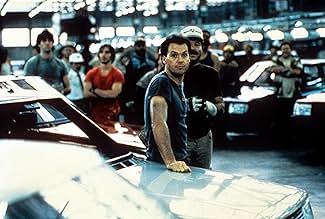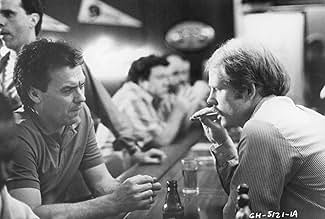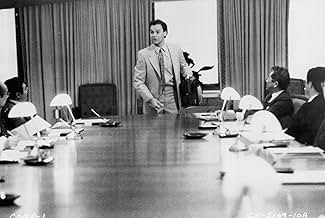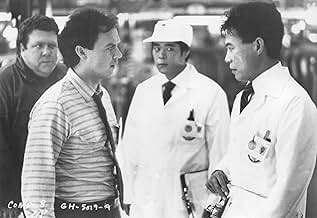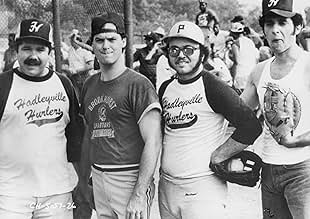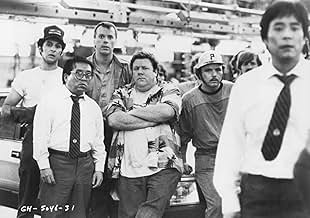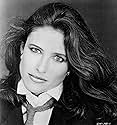Adicionar um enredo no seu idiomaWhen a Japanese automobile company buys an American plant, the American liaison must mediate the clash of work attitudes between the foreign management and native labor.When a Japanese automobile company buys an American plant, the American liaison must mediate the clash of work attitudes between the foreign management and native labor.When a Japanese automobile company buys an American plant, the American liaison must mediate the clash of work attitudes between the foreign management and native labor.
- Direção
- Roteiristas
- Artistas
- Prêmios
- 1 vitória no total
- Mr. Sakamoto
- (as Soh Yamamura)
- Umeki Kazihiro
- (as Patti Yasuiake)
Avaliações em destaque
Directed by Ron Howard, the film is about a Japanese car company that decides to buy up a shuttered American car factory in a town where it was the major source of employment. There is friction because of the numerous cultural/work culture differences between the Japanese management and the American workers. The main work problem is that the Japanese think "team" and the American workers on the line are individualists. Michael Keaton stars as Hunt Stevenson, who is promoted to liason between the American workers and the Japanese management. His problem is that he doesn't want to tell the unvarnished truth to the workers, and this gets him into trouble when he tells a lie he just can't take back that could mean the end of the plant. Gedde Watanabe plays the Japanese manager of the plant who is trying to go against his nature of caring about the home life of the workers and be "tough" so that the factory will be considered a success by the CEO back in Japan. Eventually he and Hunt form a friendship of sorts.
George Wendt of "Cheers" fame plays a worker who gets demoted to janitor. John Turturro is practically unrecognizable as another factory worker in a small part before the Coen brothers discovered him. If Ron Howard is directing then Clint Howard is not far away, usually playing a bit part, and that is true here too. Oh, if you are expecting the Michael Keaton of Birdman and Spotlight, then you are in for a surprise. This is the rather smart mouth character Keaton started out playing in the early 80s. Think of Bill Blazejowski of 1982's "Night Shift" (also directed by Ron Howard) but with a much bigger I.Q.
Why is this a time capsule and will probably be hard for you to find? When the American workers get angry they refer to their Japanese bosses with terms such as "rice a roni". Also, when Michael Keaton goes up to see the boss he refers to his Japanese secretary as "sugar puss". He isn't flirting, but that still would never make the grade in an American film today. George Wendt's character gets drunk and basically bullies and harasses the big boss' wife in a supermarket one day. Everybody just writes the episode off as the guy being angry about his demotion, as though that is acceptable behavior! It's just funny to have seen this in the theater back in 1986 and realize how much times have changed.
I'd recommend it as a great look back and as a comedic take on some of the economic issues confronting Americans in the 1980s. That decade was not as prosperous and carefree as you might have been led to believe.
Therefore, before hucking it under the pile, never to be seen again, you might want to look upon it in a most serious light and see if it doesn't share some elements of truth that you've experienced when interfacing with other cultures in your life.
Just a thought.
David I. Brager
"Gung Ho" does a better job of capturing the mood of the American industrial workforce than just about any other popular movie made during that period. Certainly the movie has its flaws -- some loose plot threads and mediocre acting jobs by everyone except Michael Keaton and Gedde Watanabe. But the story really is about the meeting of East and West: Keaton's Hunt Stevenson personifies America, brash and confident on the outside yet insecure underneath. Watanabe's Kazuhiro personifies Japan, on top of the heap with a successful system, but wondering if there is more to be learned from their Western rivals. The movie's plot, flawed as it is, simply provides a framework for the conflict, and eventually synthesis, of their two personalities.
Keaton's acting overshadows everyone else's, and practically makes the movie by itself. I've always admired Keaton for his ability to deliver lines that feel improvised, no matter what script he's following. His character, Hunt Stevenson, is a likable, affable everyman, a natural leader with a wise-ass streak. But he has a fatal flaw common to many of us: he doesn't want to disappoint anyone. He'll distract the crowd with inspirational anecdotes, and even lie, rather than point out the ugly truth.
Kazuhiro is the mirror image of Stevenson: shy and introspective, but also, because of his Japanese upbringing, reluctant to be the bearer of bad news. The scene in which Stevenson first comes to Kazuhiro with the employees' grievances captures perfectly the Japanese approach to workplace conflict. Kazuhiro replies to Stevenson's complaints with "I understand what you are saying," but won't refuse his requests out loud. Stevenson misinterprets this as agreement, and goes away saying, "Okay, we've got that settled." (This is still a problem in Japanese-American business relations in the 21st century!)
Ultimately, Kazuhiro and Stevenson have the same problem: get the factory working smoothly, meet production goals, and fulfill their responsibility to the workers under them. In working towards this goal, they each have to take a page from the others' book. Kazuhiro's family becoming more "Americanized" is an obvious example. Also note that Stevenson thinks it's odd when Kazuhiro explains how he had to make a public apology to his workers for failing them -- and yet, later in the movie, Stevenson does exactly that himself.
The plot and its resolution are a little cornball, but hey, this is a comedy. If you can overlook the movie's flaws, there is a great story about self-realization and open-mindedness here.
Você sabia?
- CuriosidadesAccording to Bloomberg Businessweek, Toyota executives later used the movie as an example of how not to manage Americans.
- Erros de gravaçãoWhen Hunt Stevenson meets the Japanese managers for the first time, they hand their business cards over with one hand. Japanese business protocol requires formally presenting business cards, holding them with both hands.
- Citações
Hunt Stevenson: If you walk out that door, you're going to miss a great comeback. We're ready to roll here, Jack.
Mr. Sakamoto: This will never be like a Japanese factory... *Jack.*
Hunt Stevenson: Oh, yeah? You're right. You know what else? So what?
Mr. Sakamoto: You failed.
Hunt Stevenson: Really? Wanna know something? I got one of the first cars ever made here. I got *the* first car ever - I don't think I want it anymore. As a matter of fact, here.
[hands keys to Mr. Sakamoto]
Hunt Stevenson: Why don't you take the keys, okay? I'd rather have one of those cars.
[points to cars in assembly line]
Hunt Stevenson: I'd rather have one of these cars that *we* made *together,* by hand. Your guys and my guys, together. You know why? Because those cars stand for something. Those cars stand for something pretty great. I'm proud of those cars. I'm taking one.
[Turns to workers]
Hunt Stevenson: Gentlemen, I'm going home in my new car!
[All workers cheer and applaud, then silently pray that Hunt's new car has a working engine. Hunt starts the car, and the workers cheer. However, the car literally falls apart after about two yards, and the workers start to moan. Hunter gets out of the car]
Hunt Stevenson: I tell ya, I thought it handled great!
- Versões alternativasSome international editions distributed by Paramount on DVD, reduced the aspect ratio from original 2.39:1 to 2.09:1.
- ConexõesFeatured in Geração X: The Power of Disruption (2016)
- Trilhas sonorasDon't Get Me Wrong
Written by Chrissie Hynde
Performed by The Pretenders
Produced by Jimmy Lavine and Bob Clearmountain
Courtesy of Sire Records Company
Principais escolhas
- How long is Gung Ho?Fornecido pela Alexa
Detalhes
Bilheteria
- Orçamento
- US$ 18.000.000 (estimativa)
- Faturamento bruto nos EUA e Canadá
- US$ 36.611.610
- Fim de semana de estreia nos EUA e Canadá
- US$ 7.170.830
- 16 de mar. de 1986
- Faturamento bruto mundial
- US$ 36.611.610
- Tempo de duração
- 1 h 52 min(112 min)
- Cor
- Proporção
- 2.35 : 1


